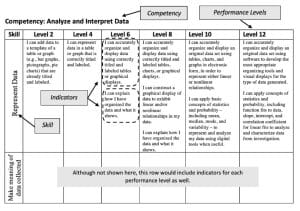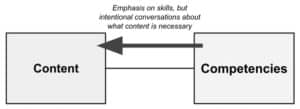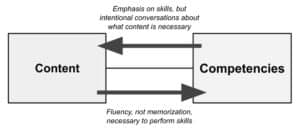Competencies Help Bridge the Gap Between Traditional and Project-Based Learning
CompetencyWorks Blog
Tommy Wolfe conducted his doctoral research on how using competencies influences teacher practice in competency-based schools. This is the first post in a series about his findings.
Competency-based education intends to transform K-12 learning to better reflect what skills are needed in the 21st century and aims for students to apply this learning authentically. For my research, I investigated learning objectives called “competencies” that seek to expand the definition of academic success. I found that teachers using competencies engaged with content in a new, thoughtful, and deliberate manner, and that competencies promoted and provided structure for more authentic project-based learning.
Competencies differ from standards in many important ways—even from a typical standards-based 4-3-2-1 scale. You can read a more in-depth explanation of competencies vs. standards, but in a nutshell, competencies are:
- Skill-based: Competencies do not reference specific content such as photosynthesis, World War II, or 19th-century American literature. Instead, examples of competencies include Analyzing & Interpreting Data, Mathematical Problem Solving, Argumentation, Conducting Research, and Presenting.
- Transdisciplinary: Competencies are transferable across disciplines. For instance, one can Analyze & Interpret Data in math, science, history, and other disciplines.
- Gradated along a continuum: A 2nd grader and a college student may both be able to analyze data (such as making a graph), but the level of rigor at which each can do this skill is clearly different. Thus, competencies are gradated along a continuum of multiple performance levels that clearly indicate what constitutes proficiency at each level.
A simplified example of the competency Analyze and Interpret Data is shown below.

For schools transitioning to competency-based education, developing competency sets is a major undertaking that can be substantially accelerated by beginning with existing, high-quality competency sets such as the following:
- Profile of a South Carolina Graduate Competency Framework
- Building 21
- Idaho State Board of Education College and Career Readiness Competencies
Navigating Content and Authenticity
To understand how teachers use competencies and how they may influence teacher practice, I interviewed multiple teachers that were teaching at competency-based high schools. Many interesting patterns emerged from these conversations, and one in particular was a dynamic between competencies, content, and project-based learning.

Mastering a broader range of content has been a hallmark of traditional education and is typically assessed with in-class tests that narrow in on specific concepts while putting less priority on relevance and authenticity. On the other end, project-based learning focuses more on authenticity by solving real-world problems for authentic audiences and building skills for lifelong learning. As a high school science teacher, I continually experience the challenge of working to provide the most authentic experiences I can for my students while also ensuring particular skills and content are learned.
Competencies Can Help Distill Essential Content
For the schools in this study, students were assessed on competencies, so there was already a structural element that emphasized teaching skills in addition to content. Teachers clearly valued teaching skills, but they also held strong beliefs about content. They believed that particular content was essential for students to achieve enduring understandings such as being able to make health-related decisions from a biology class or being an actively engaged citizen from a social studies class. As a result, teachers put an incredible amount of thought and deliberation into distilling what content was worth diving deep into.

Competencies Require Content
In addition to ensuring that essential content would be included, teachers acknowledged that content is essential to mastering the competencies—that students could not perform the skills without the content. Some classes included content-based assessments that were structured similarly to a traditional quiz but did not contribute to a student’s grade. Instead, the quiz helped students build knowledge and skills needed to succeed on a performance task for a given competency. Some teachers even had multiple assessments ready for when students determined they were ready to demonstrate their content knowledge. They could start with one of the assessments and take other versions later if necessary.
Content was valued among teachers, but there was a key distinction between memorization and fluency (i.e., the ability to acquire, process, re-access, and apply information). “I am trying to teach them to collect and use their own information,” explained one history teacher, while another science teacher said:
“I believe that all quizzes and tests should be open book, because what person just can’t look up something if they need to find something out! [Memorizing] is not the point. If that’s the point—[you’re] assessing on a very narrow basis.”
Even when competencies were focused on skills, content was still valued, and content fluency was valued more than content memorization.

Competencies Ground Project-Based Learning
In one interview, an educator expressed a problem that can arise in project-based learning:
“My biggest complaint about project-based learning—[and] I think project-based learning is awesome—but if we are never being intentional about what we want students to know and be able to do…then [at the end of the project] maybe they have learned something, maybe they haven’t.”
With this in mind, an important theme found among interviews with teachers was how competencies can pull or ground project-based learning towards a more defined structure. One teacher who had been doing project-based learning for decades described the structure and guidance competencies give as follows:
“[With the competencies] you know they’re learning 21st-century skills and the kind of skills that are going to help them function a lot better in the world that we have today. So, it forces you [as a teacher] to make sure…You can’t just have fun and do projects and not worry about that…you have to make sure all the things that you are doing are aligned to these competencies.”
Thus, competencies appeared to help teachers pull the open-endedness of authentic projects towards well-defined, skill-based learning targets. From my own experience as a teacher, the authenticity of a project can be sacrificed when I have needed to incorporate narrow content-based learning targets that do not naturally fit. Because competencies are skills, they more easily align with the work required for project-based learning.

Competencies Encourage Project-Based Learning
Teachers also saw competencies as a way to propel the authenticity of project-based learning. One school leader explained that they wrote their competencies in a way that they could only be assessed with performance-based assessments. A math teacher took this idea even further stating, “I don’t know how you [could incorporate one without the other]. They kind of go together—the project-based and the competency-based.”

Transforming schools to competency-based education is much more than tinkering around the edges. Rather than simply having students move more flexibly through the traditional approach to K-12 education, it aims to profoundly change how students learn. Taking into account the issues described here may be beneficial in advancing competency-based curriculum design and professional learning.
Learn More
- How Competencies Influence Teacher Practice
- Scaffolds for Student Agency
- Teacher Insights on Developing Competency-Based Practices in the Classroom
 Tommy Wolfe is a high school science teacher at Adlai E. Stevenson High School in Lincolnshire, Illinois, and is an Adjunct Professor acting as the Competency-Based Lead for DePaul University’s Office of Innovative Professional Learning in Chicago, IL. He holds a B.S. in Integrative Biology, a B.S. in Psychology, an M.Ed. in Curriculum and Instruction from the University of Illinois at Urbana Champaign, and a Ph.D. in Educational Leadership from DePaul University.
Tommy Wolfe is a high school science teacher at Adlai E. Stevenson High School in Lincolnshire, Illinois, and is an Adjunct Professor acting as the Competency-Based Lead for DePaul University’s Office of Innovative Professional Learning in Chicago, IL. He holds a B.S. in Integrative Biology, a B.S. in Psychology, an M.Ed. in Curriculum and Instruction from the University of Illinois at Urbana Champaign, and a Ph.D. in Educational Leadership from DePaul University.